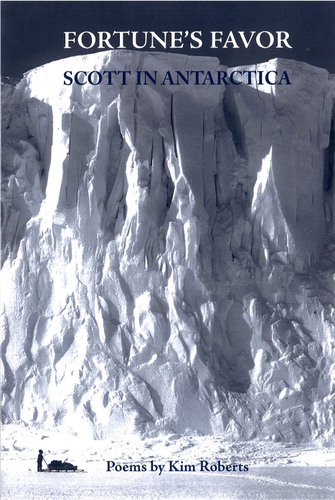Review of Fortune's favor: Scott in Antarctica, by Kim Roberts (2015). Washington, DC: Poetry Mutual Press. 56 pp. ISBN 978-1-329-00621-8.
Fortune's favor is a sequence of prose poems that depict some of the perceptions, experiences and emotions of Robert Falcon Scott during his second expedition. The purpose of the mission—which ended in 1912—had been to reach the geographic and magnetic South poles and its disaster marked the close of a period that we now often speak of as the Heroic Age of Polar Exploration. Nansen, Shackleton and Peary were among the most principal of those titans.
The aim of the expedition was scientific, whereas this small book is a poetic composition in which the imagination of the author depicts some of the personal events and observations recorded by Scott in his journal. If the reasoning of poetry is to create or recreate human emotion and to indicate what we might call universal truth, then Kim Roberts in this book, her fourth book of poetry, accomplishes a small and succinct triumph in delineating the tragic course of Scott's team during those two years on the ice, for a victorious Roald Amundsen had already arrived at the pole more than a month before Scott's party. Kim Roberts has drawn upon the journal of Scott—first published in 1913 and never out of print since then—to write this book and there are seven accompanying photographs that acutely illustrate her work of 20 pieces, each poem being made up of 14 lines.
Science is inferential and rational, poetry is inspired and metaphorical: Roberts merges these two intellectual forms by deriving her own experience—what in fact becomes the book—from the written logbook of the explorer, as she re-enacts his voice and thought; there is thus a double textuality at work here. The title of the book is incidentally Shakespearean, being reminiscent of some of the wording of the sonnets and other Elizabethan poems where an idealized lover is spurned and rejected by life.
The cycle begins in November 1910, as the exploration vessel Terra Nova approached the continent and its ice: “The seas continually rise, continually break on weather bulwarks” (p. 13). As the poetry proceeds, individual men of the expedition are mentioned in the verses as the author creates a series of vignettes—mainly visual in style—that establish the temporal narrative of both the men and of the book. A brief glossary of members is given at the rear of the volume, telling of each character who appears in the work.
The team arrives at 90°S only to find the “sledge grooves, ski tracks, paw prints of many dogs, a black flag” of Amundsen's group (p. 35). Then the return begins, along with the physical and mental decline of the explorers and their eventual demise despite the magnificent leadership of Scott who vows that, “we'll see the game through with the proper spirit” (p. 41). As he says at the end, commenting on the death of another officer, “this was the act of a brave English gentleman” (p. 42): such was the moral culture of that pre-war age. Each page in the book is a precise verbal and literary snapshot taken from the language of Scott's journal and occasionally augmented and amplified by original photographs. The effect of such careful bricolage is highly distinct and authentic.
For those who do not have the time, the inclination or the access to read the journal itself, Fortune's favor offers a poignant and chiaroscuro portrait of the unsuccessful expedition, summarising certain vivid momentary details for the reader. Roberts maintain a steadily objective account that is specific and neither fanciful nor metaphysical. For those who have no knowledge of the period or of this audacious attempt, the book brings to life a courageous but sad incident in humanity's struggle to understand the unknown terrain of our planet. The work is a slight but wonderful tribute to humanity's endeavour towards the acquisition of empirical knowledge in the face of terrific natural duress. The scientific pursuit of understanding is not always achieved in a laboratory and sometimes requires mortal valour if actual gains are to be made, and science, in the words of Scott, must always “bow to the will of Providence.”

